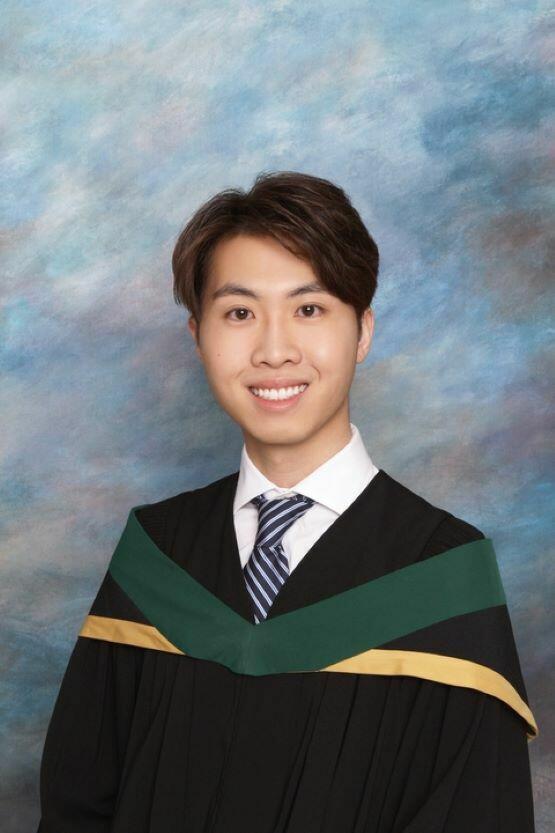BHSc Alumni Spotlight
Bioinformatics

Ryan Lee'21
Manager, Information Management - Pfizer
- BHSc Hons. - Bioinformatics - University of Calgary
- MPrecH - Precision Health (Quality and Safety Leadership) - University of Calgary
Drawing from diverse disciplines has given me the ability to approach problems from multiple perspectives and act as a bridge between health and technical teams.
Ryan Lee, BHSc'21
What is your favorite BHSc memory?
I don’t think I’ll ever forget the memories made in the Feasby Lounge. It was both a respite from our long days in Clara Christie where we would play foosball, pool, and table tennis, as well as a place where we bonded over memorizing flashcards and sharing mnemonics with each other on the white boards. I felt like I was making a new friend each time because we all shared an unspoken understanding—we were in the same boat, and spending time together made it more enjoyable.
Looking back, what advice would you give yourself as a student?
Qué será, será—whatever will be, will be. All those sleepless nights and anxieties I poured into maintaining the smallest margins in grades to keep up with everyone chasing med school feel so futile now that I’m on a completely different path. Despite being labeled as ‘inflexible’ in a personality test 😅, I’ve always been intentional about keeping every door open. Avoiding tunnel vision or rigid expectations of outcomes has opened up opportunities I could never have imagined. Looking back, I think if I had adopted this mentality earlier, I might have been less prone to burnout.
What is the best thing about your current job?
In this tough job market, I’m incredibly fortunate to have a role that not only aligns with my passion but also builds on my educational and professional experiences. What I once considered a failed undergrad thesis—due to its lack of results—has become the foundation of my current work, addressing challenges like data quality and standardization. My exposure to ICD codes during my thesis prepared me for working with EHRs and now for a project automating clinical coding.
The skills I gained during my Master’s in Precision Health, like project management and quality improvement, have also equipped me to make meaningful changes at work. It’s rewarding to see how past challenges have prepared me to tackle familiar problems in new contexts.
How has your career evolved?
As a bioinformatician, I’ve always navigated the intersection of medical and computer science work. My initial goal as a student was to pursue medicine while retaining a technological mindset to reimagine healthcare. However, working as a data analyst for AHS during COVID shifted my focus entirely to technical work, where I realized that, at a granular level, I was essentially working with numbers—regardless of the medical context.
My next role, performing data migrations for Telus Health, reconnected me with healthcare by working with personal health information. It allowed me to use my health science background to support improved patient outcomes through digitized data. Now, at Pfizer, I’m gaining deeper exposure to the drug development process while utilizing my programming expertise to innovate and automate processes across departments, from safety to regulatory to clinical.
Having a health background has been invaluable. It helps me identify bottlenecks, understand the impact of improvements, and drive meaningful innovation. While I initially thought my role would focus more on project management, I’ve enjoyed the balance of coding and strategy work. My unique skillset allows me to act as a data engineer, making data strategy recommendations while developing proof-of-concept solutions to persuade stakeholders to embrace change.
Ultimately, I hope my contributions will help bring drugs to market faster—safely and effectively—impacting patients’ lives in a meaningful way.
How did your BHSc degree help you get to where you are now/current career?
Although I haven’t focused on traditional bioinformatics work, like sequencing or model-building, choosing this major shaped my passion for tackling healthcare challenges through a technological lens. Had I pursued biomed, which is what I also considered, I likely wouldn’t have had the same exposure to interdisciplinary work. Drawing from diverse disciplines has given me the ability to approach problems from multiple perspectives and act as a bridge between health and technical teams.
This unique position at the intersection of healthcare and technology allows me to navigate evolving challenges in the field and find optimal solutions for complex problems—a skillset that feels especially relevant in today’s rapidly changing healthcare landscape.
What is the best piece of advice you have received during your career journey?
Don’t be afraid to ask for help. As someone who’s independent and determined, I often hesitate to reach out, trusting that I’ll figure it out eventually. Early on, I thought solving problems on my own reflected better on me. But I’ve realized that asking for help doesn’t diminish your ability—it enhances it.
Not only can you learn from others’ insights, but it also brings visibility to the challenges you’re facing. If others aren’t aware of the issue, they can’t offer alternative solutions, redirect your efforts, or make better decisions. Asking for help isn’t just about solving your problem—it’s about fostering collaboration and creating better outcomes for everyone involved.

The Giant Walkthrough Gut: Virtual Reality Simulation of the Digestive System
The Giant Walkthrough Gut is an immersive 3D computer model that utilizes virtual reality (VR) technology to fully explore and learn about the digestive system. The Giant Walkthrough Gut was developed using Unreal Engine by Epic Games, allowing for two different versions of visualization: a video and an exploratory program designed for both VR and desktop monitors.
